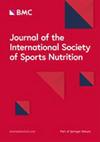Vitamin D supplementation and body composition changes in collegiate basketball players: a 12-week randomized control trial
IF 4.5
2区 医学
Q1 NUTRITION & DIETETICS
Journal of the International Society of Sports Nutrition
Pub Date : 2021-03-02
DOI:10.1080/15502783.2022.2046444
引用次数: 3
Abstract
ABSTRACT Background Vitamin D promotes bone and muscle growth in non-athletes, suggesting supplementation may be ergogenic in athletes. Our primary aim was to determine if modest Vitamin D supplementation augments favorable body composition changes (increased bone and lean mass and decreased fat mass) and performance in collegiate basketball players following 12 weeks of standardized training. Methods Members of a men’s and women’s NCAA D1 Basketball team were recruited. Volunteers were randomized to receive either a weekly 4000 IU Vitamin D3 supplement (D3) or placebo (P) over 12 weeks of standardized pre-season strength training. Pre- and post-measurements included 1) serum 25-hydroxy vitamin D (25(OH)D); 2) body composition variables (total body lean, fat, and bone mass) using dual-energy X-ray absorptiometry (DXA) scans and 3) vertical jump test to assess peak power output. Dietary intake was assessed using Food Frequency questionnaires. Main outcome measures included changes (∆: post-intervention minus pre-intervention) in 25(OH)D, body composition, and performance. Results Eighteen of the 23 players completed the trial (8 females/10 males). Eight received the placebo (20 ± 1 years; 3 females) while ten received Vitamin D3 (20 ± 2 years; 5 females). Weekly Vitamin D3 supplementation induced non-significant increases (∆) in 25(OH)D (2.6 ± 7.2 vs. −3.5 ± 5.3 ng/mL; p = 0.06), total body bone mineral content (BMC) (73.1 ± 62.5 vs. 84.1 ± 46.5 g; p = 0.68), and total body lean mass (2803.9 ± 1655.4 vs. 4474.5 ± 11,389.8 g; p = 0.03), plus a non-significant change in body fat (−0.5 ± 0.8 vs. −1.1 ± 1.2%; p = 0.19) (Vitamin D3 vs. placebo supplementation groups, respectively). Pre 25(OH)D correlated with both Δ total fat mass (g) (r = 0.65; p = 0.003) and Δ total body fat% (r = 0.56; p = 0.02). No differences were noted in peak power output ∆ between the D3 vs. P group (−127.4 ± 335.4 vs. 50.9 ± 9 W; NS). Participants in the D3 group ingested significantly fewer total calories (−526.2 ± 583.9 vs. −10.0 ± 400 kcals; p = 0.02) than participants in the P group. Conclusions Modest (~517 IU/day) Vitamin D3 supplementation did not enhance favorable changes in total body composition or performance, over 3 months of training, in collegiate basketball players. Weight training provides a robust training stimulus for bone and lean mass accrual, which likely predominates over isolated supplement use with adequate caloric intakes.大学生篮球运动员补充维生素D与身体成分变化的12周随机对照试验
摘要背景维生素D能促进非运动员的骨骼和肌肉生长,这表明补充维生素D可能对运动员产生工效学影响。我们的主要目的是确定在经过12周的标准化训练后,适度补充维生素D是否能增强大学篮球运动员的身体成分变化(增加骨骼和瘦质量,减少脂肪质量)和表现。方法招募NCAA女子D1篮球队和男子D1篮球队队员。志愿者被随机分配在12周的标准化季前力量训练中接受每周4000 IU的维生素D3补充剂(D3)或安慰剂(P)。前后测量包括1)血清25-羟基维生素D(25(OH)D);2) 使用双能X射线吸收仪(DXA)扫描和3)垂直跳跃测试来评估峰值功率输出的身体成分变量(全身瘦、脂肪和骨量)。饮食摄入量采用食物频率问卷进行评估。主要结果指标包括25(OH)D、身体成分和表现的变化(∆:干预后减去干预前)。结果23名运动员中有18人完成了试验(8名女性/10名男性)。8人服用安慰剂(20±1岁;3名女性),10人服用维生素D3(20±2岁;5名女性)。每周补充维生素D3导致25(OH)D(2.6±7.2 vs.−3.5±5.3 ng/mL;p=0.06)、全身骨矿物质含量(BMC)(73.1±62.5 vs.84.1±46.5g;p=0.68)和全身瘦体重(2803.9±1655.4 vs.4474.5±11389.8g;p=0.03)无显著增加(∆),加上体脂的无显著变化(−0.5±0.8 vs.−1.1±1.2%;p=0.19)(维生素D3补充组vs.安慰剂补充组)。前25(OH)D与Δ总脂肪质量(g)(r=0.65;p=0.003)和Δ全身脂肪%(r=0.56;p=0.02)相关。D3组与p组之间的峰值功率输出∆没有差异(−127.4±335.4 vs.50.9±9 W;NS)。D3组的参与者摄入的总热量明显少于p组的参与者(−526.2±583.9 vs.−10.0±400 kcals;p=0.02)。结论在大学篮球运动员3个月的训练中,适度(~517 IU/天)补充维生素D3并不能促进其全身组成或表现的有利变化。重量训练为骨骼和瘦体重的增加提供了强有力的训练刺激,这可能比单独使用热量摄入充足的补充剂更为重要。
本文章由计算机程序翻译,如有差异,请以英文原文为准。
求助全文
约1分钟内获得全文
求助全文
来源期刊

Journal of the International Society of Sports Nutrition
NUTRITION & DIETETICS-SPORT SCIENCES
CiteScore
8.80
自引率
3.90%
发文量
34
审稿时长
6-12 weeks
期刊介绍:
Journal of the International Society of Sports Nutrition (JISSN) focuses on the acute and chronic effects of sports nutrition and supplementation strategies on body composition, physical performance and metabolism. JISSN is aimed at researchers and sport enthusiasts focused on delivering knowledge on exercise and nutrition on health, disease, rehabilitation, training, and performance. The journal provides a platform on which readers can determine nutritional strategies that may enhance exercise and/or training adaptations leading to improved health and performance.
 求助内容:
求助内容: 应助结果提醒方式:
应助结果提醒方式:


